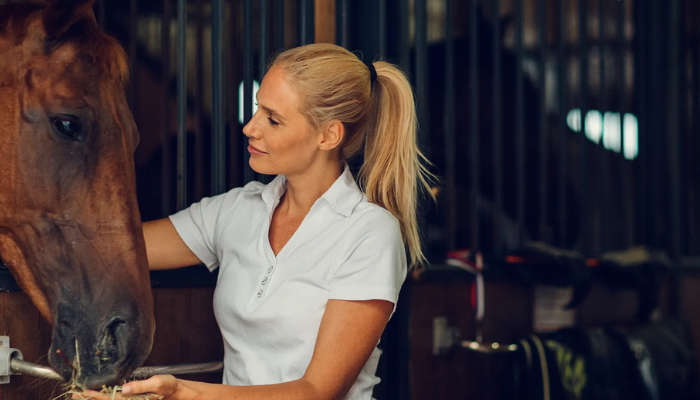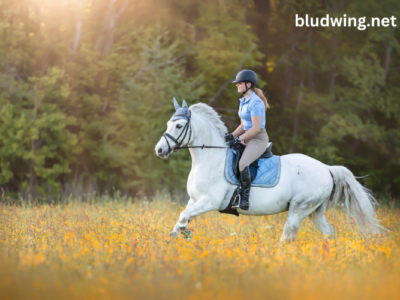Horses are magnificent creatures that require dedicated care to thrive. Whether you’re a seasoned equestrian or a first-time horse owner, understanding the essentials of horse care is crucial. Proper maintenance of your horse’s health and well-being involves several key aspects: nutrition, grooming, exercise, shelter, and veterinary care. This guide will walk you through the fundamental steps to ensure your equine companion remains healthy and happy. Explore a wide range of courses on CasaCourses, designed to enhance your skills and knowledge. Enroll now to take your learning to the next level!
Nutrition
A well-balanced diet is vital for a horse’s health. Horses are herbivores with a digestive system designed to process a continuous supply of forage. Here are the key components of a horse’s diet:
Forage
- Hay and Pasture: The primary source of nutrition for horses. Ensure the hay is of good quality, free from mold and dust. Access to fresh pasture is ideal but should be managed to prevent overgrazing.
- Types of Hay: Alfalfa, Timothy, Bermuda, and Orchard grass are common types. The choice depends on the horse’s needs and availability.
Concentrates
- Grains and Pellets: Supplements to forage, especially for horses with higher energy requirements. Common grains include oats, barley, and corn.
- Commercial Feeds: Formulated feeds that provide a balanced mix of essential nutrients. Always choose feeds appropriate for your horse’s age, workload, and health status.
Water
- Fresh and Clean: Horses require constant access to fresh, clean water. On average, a horse drinks 5-10 gallons of water per day, depending on the climate and activity level.
Supplements
- Vitamins and Minerals: Depending on the forage quality, additional supplements might be necessary. Consult with a veterinarian or equine nutritionist to determine specific needs.
Grooming
Regular grooming is essential for maintaining a horse’s coat, skin, and overall health. Grooming also strengthens the bond between horse and owner.
Tools
- Curry Comb: Used to loosen dirt and stimulate skin oils.
- Hard and Soft Brushes: Remove dirt and smooth the coat.
- Hoof Pick: Essential for cleaning hooves and preventing infections.
Routine
- Daily Grooming: Brushing the coat, mane, and tail to remove dirt and tangles.
- Hoof Care: Cleaning hooves daily and checking for signs of injury or disease.
Exercise
Regular exercise is crucial for a horse’s physical and mental health.
Types of Exercise
- Turnout: Allowing horses to roam and graze freely in a pasture.
- Riding and Training: Structured exercise tailored to the horse’s discipline, such as dressage, jumping, or trail riding.
- Lunging: A controlled way to exercise and train horses from the ground.
Benefits
- Physical Health: Maintains muscle tone, cardiovascular health, and joint mobility.
- Mental Stimulation: Reduces stress and boredom, promoting overall well-being.
Shelter
Providing a safe and comfortable environment is essential for a horse’s health.
Stabling
- Stalls: Should be spacious, well-ventilated, and regularly cleaned.
- Bedding: Use absorbent materials like straw, wood shavings, or specialized bedding to keep the stall dry and comfortable.
Pasture Management
- Fencing: Ensure it is secure and safe, with no sharp edges or gaps.
- Shelter: Provide a run-in shed or other shelter to protect from harsh weather conditions.
Veterinary Care
Regular veterinary care is essential for early detection and prevention of health issues.
Routine Check-ups
- Vaccinations: Keep up-to-date with necessary vaccines based on your region and the horse’s exposure risks.
- Dental Care: Regular dental check-ups to prevent and treat issues like sharp edges and uneven wear.
- Parasite Control: Implement a deworming schedule based on fecal egg counts and veterinarian recommendations.
Emergency Care
- First Aid Kit: Keep a well-stocked first aid kit accessible for minor injuries and emergencies.
- Know the Signs: Be aware of common signs of illness such as colic, lameness, and respiratory issues, and seek immediate veterinary assistance if needed.
Conclusion
Caring for a horse is a rewarding commitment that requires knowledge, time, and dedication. By focusing on proper nutrition, regular grooming, adequate exercise, safe shelter, and routine veterinary care, you can ensure your equine companion leads a healthy and fulfilling life. Remember, each horse is unique, so tailor your care practices to meet your horse’s individual needs and consult with professionals whenever necessary. With the right care, your bond with your horse will grow stronger, leading to many joyful years together.

















Comments